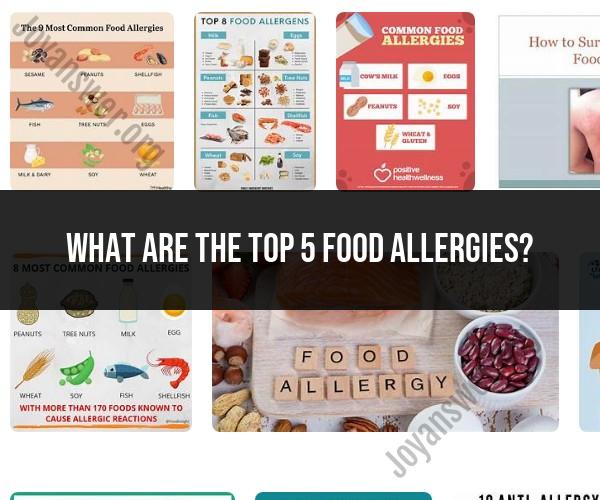What are the top 5 food allergies?
The top 5 food allergies are the most common food allergies that individuals may experience. These allergies involve an adverse immune response to specific proteins found in certain foods. The top 5 food allergies are:
Peanut Allergy:
- Peanut allergy is one of the most common and potentially severe food allergies.
- Symptoms can range from mild skin reactions to life-threatening anaphylaxis.
- Cross-contamination is a concern, and individuals with peanut allergies must be vigilant about reading food labels and avoiding peanuts and peanut-containing products.
Tree Nut Allergy:
- Tree nuts include a variety of nuts such as almonds, cashews, walnuts, and hazelnuts.
- Tree nut allergies can also lead to severe allergic reactions, including anaphylaxis.
- People with tree nut allergies may need to avoid all tree nuts, and cross-contamination is a concern, so careful label reading is important.
Milk Allergy:
- Milk allergy involves an allergic reaction to proteins found in cow's milk, including casein and whey.
- Symptoms can include hives, digestive upset, and in severe cases, anaphylaxis.
- Individuals with milk allergies need to avoid all dairy products and may need to consider dairy alternatives.
Egg Allergy:
- Egg allergy is most often a reaction to proteins in the egg white.
- Symptoms can range from skin reactions to digestive upset and anaphylaxis.
- Egg allergies can be challenging because eggs are present in many processed foods, baked goods, and sauces.
Wheat Allergy:
- Wheat allergy is different from celiac disease (gluten intolerance) and involves an allergic reaction to proteins found in wheat.
- Symptoms may include hives, digestive issues, and respiratory symptoms.
- Individuals with wheat allergies need to avoid wheat-containing products and may need to seek gluten-free alternatives.
It's important to note that while these are the top 5 food allergies, individuals can also be allergic to other foods, including soy, fish, shellfish, and various fruits and vegetables. Allergic reactions can vary in severity, with some individuals experiencing mild symptoms and others facing life-threatening reactions.
If you suspect a food allergy or have a known food allergy, it's crucial to seek guidance from a healthcare professional, such as an allergist or immunologist, who can provide proper diagnosis, allergy testing, and personalized recommendations for managing your allergies. Allergists can also provide information about carrying epinephrine auto-injectors (e.g., EpiPen) for emergency treatment of severe allergic reactions.
The five most common food allergies are:
- Milk
- Eggs
- Peanuts
- Tree nuts
- Soy
These foods account for over 90% of all food-related allergic reactions.
Food Allergies in Focus: Understanding the Prevalence of the Top 5
- Milk allergies are the most common food allergy in children, affecting about 3% of children under the age of 3. Most children outgrow their milk allergy by the time they are 5 years old.
- Egg allergies are the second most common food allergy in children, affecting about 2% of children under the age of 3. Most children outgrow their egg allergy by the time they are 16 years old.
- Peanut allergies are the most common food allergy in adults, affecting about 1% of the population. Peanut allergies are a lifelong allergy, and there is no cure.
- Tree nut allergies are the second most common food allergy in adults, affecting about 1% of the population. Tree nut allergies are also a lifelong allergy, and there is no cure.
- Soy allergies are the fifth most common food allergy in children, affecting about 0.5% of children under the age of 3. Most children outgrow their soy allergy by the time they are 10 years old.
Allergic Reactions: The Primary Culprits Among Food Allergens
Food allergies are caused by an overreaction of the immune system to a harmless food protein. The immune system produces antibodies called immunoglobulin E (IgE) antibodies, which bind to the food protein and trigger the release of histamine and other inflammatory mediators.
Histamine and other inflammatory mediators cause the symptoms of an allergic reaction. These symptoms can range from mild, such as hives and itching, to severe, such as anaphylaxis. Anaphylaxis is a life-threatening allergic reaction that can cause difficulty breathing, swelling of the throat, and a drop in blood pressure.
If you suspect that you or someone you know has a food allergy, it is important to see a doctor or allergist for diagnosis and treatment.
There is no cure for food allergies, but there are things you can do to manage your symptoms and prevent allergic reactions. These include:
- Avoiding the allergen
- Taking over-the-counter or prescription medications as needed
- Using an epinephrine auto-injector (such as an EpiPen) to treat anaphylaxis
By following these tips, you can manage your food allergies and live a healthy and active life.













